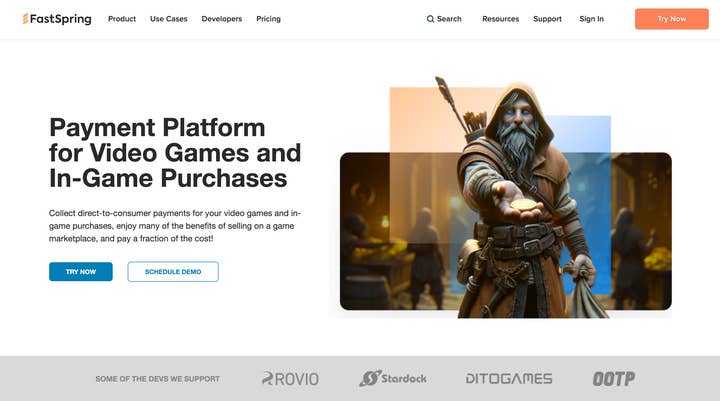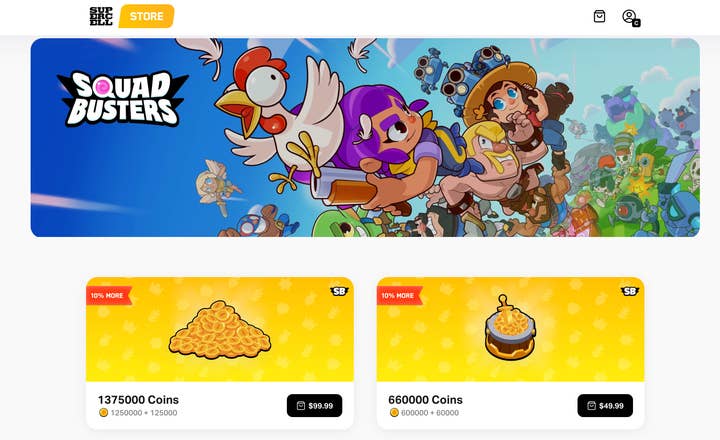What do Apple and Google’s direct-to-consumer changes really mean for game developers?
FastSpring also shares advice on how studios can best adopt direct-to-consumer payment solutions
The direct-to-consumer payment landscape for mobile game developers is changing. Rapidly. Courts and regulators in both the EU and the US have taken issue with Google and Apple's app store monopolies, which means in the near future, mobile game developers may no longer have to mandatorily surrender a 30% cut on all in-game purchases.
Traditionally, selling in-game items or virtual currency through an external webshop has generally been allowed without additional fees by Apple and Google, so long as you don’t embed payments directly inside your mobile game, or steer players with calls-to-action inside the game to buy items from an external webshop.

Recent regulatory and legal pressure has forced Apple and Google to make concessions on embedded payments. However, these concessions have come with prohibitively high fees that negate most of the financial value of direct-to-consumer. This has spurred lawsuits from app and game publishers like Epic, Spotify, and others, which will further increase pressure. Other game publishers are still in wait-and-see mode as these lawsuits play out.
That said, direct-to-consumer is still a viable growth strategy for mobile game publishers, and there are many excellent examples of success to learn from including Warner Bros' Game of Thrones Conquest, Scopely’s Marvel Strikeforce, and the Supercell store.
How can developers monetise their mobile games with direct-to-consumer today? Well, that's a little more complicated. The freedom of monetizing with direct-to-consumer comes with the complexities of global payment methods, currency localisation, and local sales tax/VAT compliance, all of which need to be scrupulously observed to ensure you don't fall foul of the law. This is where the convenience of a direct-to-consumer payments specialist like FastSpring comes in, saving you not only time but considerable money, too. While it focuses on your payments (and, importantly, fraud prevention), you can stay focused on making great games.
"The freedom of monetizing with direct-to-consumer comes with the complexities of global payment methods, currency localisation, and local sales tax compliance
"Video game publishers have numerous options when it comes to direct-to-consumer payment providers, making it challenging to determine the best choice," admits David Nachman, CEO of FastSpring. FastSpring is a Merchant of Record (MoR) payment provider, which mean it's a trusted third-party firm that assumes responsibility for processing your payments, and sales tax compliance worldwide. It has almost two decades of experience providing payment solutions to publishers unsure about how best to navigate the complexities of global payments and sales tax compliance.
"Our solution seamlessly integrates payments either directly within video games or on a publisher's webshop. Our comprehensive service facilitates payments through multiple global processors to ensure optimal approval rates, offers a wide variety of payment methods around the globe, manages all global sales tax and VAT compliance automatically, offers robust video game-specific fraud prevention, provides dedicated customer support, and much more."
Nachman says that whilst there's been a lot of progress with lawsuits like Epic v. Google – for which FastSpring was called upon to provide evidence – there's still a lot for developers and publishers to consider even without looming app store rule changes around direct-to-consumer.

Because of its 19 years of experience as an all-in-one payments provider, FastSpring considers itself uniquely placed to "allow video game publishers to spend more time making great games and less time selling them." Thanks to its specialized knowledge of local payment methods, video game-specific fraud prevention, and tax compliance, FastSpring has even helped game developers and publishers break into new markets.
"Marketplaces serve as excellent platforms for reaching new audiences for games, while simultaneously offloading the complexities of payment processing and tax compliance. Game studios simply upload their game to the marketplace and receive their earnings monthly," Nachman explains, acknowledging that a lot of game studios use the familiar method of selling their games through Steam, the PlayStation, Xbox, and Nintendo online stores, and/or mobile app stores.
"But for game publishers considering a move beyond marketplaces to direct-to-consumer sales, FastSpring is a great choice because we offer many of the payment and tax compliance benefits of a marketplace thanks to our comprehensive all-in-one platform and Merchant of Record model.
"Like a marketplace, the MoR model offloads the burdens of payment processing and tax compliance. However, it does so within an experience directly embedded in your game or on your webshop, and at a significantly lower cost than marketplaces."
As for publishers already selling directly to their players? FastSpring can still help there, too; its global payments coverage enables studios to expand into all-new markets "or as a redundant provider in their existing payment stack to leverage FastSpring’s high approval rates, or simply as a failover option."
"FastSpring is a great choice because we offer many of the payment and tax compliance benefits of a marketplace"
While FastSpring is ready to help with direct-to-consumer strategies today, Nachman said FastSpring is still committed to the fight for open commerce in mobile with embedded payments and steering allowed without additional fees in the future.
When the Google vs Epic ruling came down last December, Nachman was quick to respond, stating he and FastSpring were "ecstatic that game developers will have more choice in how they bring their games to market." He called it "a major win" that he suspected would "have a huge impact on gamers across the industry" and enable devs "to deliver better games and pricing for their players." And it's this commitment to consumer choice and developer freedoms that FastSpring champions most.
"At FastSpring, we support open computing and believe that people should have choice when installing games and software on their phones," Nachman explains. "We also believe that game developers should have choice over the payment solutions they support in their games.
"Apple and Google have been responding to the recent lawsuits and regulations by updating their terms to 'comply' but these changes so far have resulted in a great big juicy nothing-burger," Nachman adds. The recent app store term changes – which include a 28% fee for transactions that happen outside of the app and a limited ability to load apps outside the respective app stores – include "mind-bending gotchas" that essentially negate any material benefit for players or game developers.

It's because of this that Nachman expects, in the short term, to see game companies start aggressively pushing the line in their direct-to-consumer strategies with mobile games "now that weaknesses have emerged", along with further lawsuits protesting the recent app store terms changes.
In the mid-to-long term, he opines that ongoing lawsuits may force even more changes to app store terms and conditions that are more in line with rulings and regulations.
"One thing we can confidently predict is that Apple and Google will keep fighting to protect their global duopoly, and everyone else will keep fighting for choice," Nachman insists.
To learn more about FastSpring’s global payments and subscription management platform, get in touch via the website.
